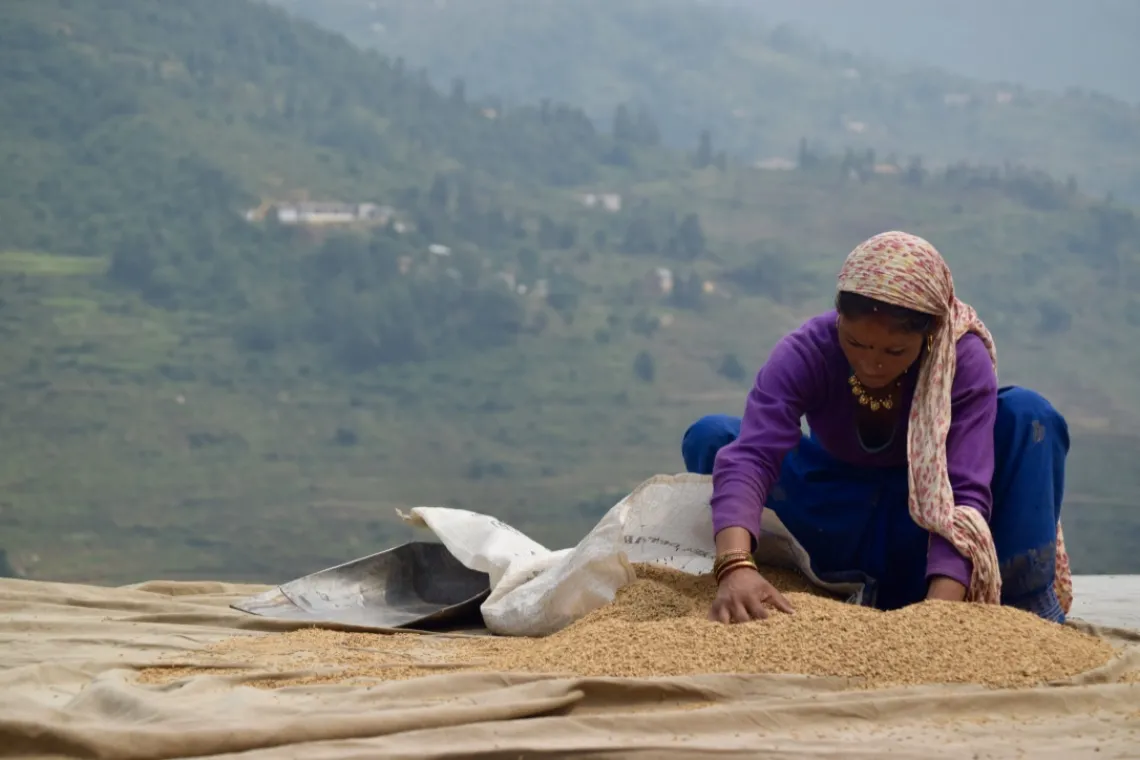UA Student Balances Heritage and Hydropower in the Himalayas

University of Arizona graduate student Arica Crootof is out to change the world for the better, one hillside at a time. Crootof, one of four Carson Scholars in three years to receive a U.S. Borlaug Fellowship in Global Food Security, a grant funded by the U.S. Agency for International Development, will head to the Himalayas in January to understand and resolve tensions between small hydropower plants and Nepalese farming communities.
Crootof’s work is an extension of her research in Uttarakhand, India. For rural farmers there, the rivers that have coursed through their villages for generations have been vital to their livelihoods, which center on growing rice in the steep terraces that blanket the hills. The constant flow of the river also has brought fish to eat and water to drink and has taken with it the cremated ashes of villagers during traditional funeral practices. But a decade after small hydropower plants began to crop up in the plains below, diverting much of the flow from the farmers, the areas that were once ideal for agriculture have become dry, and the farmers have become angry.
“Because these projects are ‘small,’ they can skirt around a lot of the regulatory practices, and so they don’t need to have an environmental impact assessment done. But the impacts are actually pretty significant for the people who live there and it changes their ability to access that water,” said Crootof, a PhD student in the School of Geography and Development who studied rural farming agriculture conditions in the Himalayas in the summer of 2015 and 2016.
Using her $20,000 Borlaug grant, Crootof will conduct surveys of both the farmers and hydropower operators to ultimately help broker a solution that benefits everyone.
“Benefit sharing goes beyond compensation and actually ensures that there is local development,” Crootof said. “This means that some percentage of hydropower profits can go back to the community or they can get some amount of energy.”
Beyond the more immediate issue of food security for the farmers, Crootof also is examining the implementation of clean energy initiatives. Because these hydropower projects are relatively small, diverting the river for only three to five miles (the length of up to four Golden Gate bridges), they are not tested for potential environmental and societal impacts. Crootof said that while hydropower produces clean energy, its negative impacts at a foundational level should not be ignored.
“We can’t just say that transitioning to renewable energy is a good thing. It depends on how we transition to renewable energy,” she said. “What happens on the ground is important, and we cannot just neglect the local people just so we can have clean energy.”
Crootof was one of two Carson Scholars to win a Borlaug Fellowship in 2016. Funded by the UA’s Institute of the Environment, Biosphere 2, the Agnese Nelms Haury Program in Environment and Social Justice, the Renewable Energy Network, and private donations, the competitive Carson Scholars Program supports graduate student research with a $5,000 scholarship and trains scholars to effectively explain their research to the public.
Fiona Gladstone is currently in Oaxaca, Mexico, studying how a Mexican national food assistance program interacts with local agriculture food practices. Carly Nichols, a 2015 Borlaug recipient, traveled to North India to study how agriculture intervention is affecting gendered labor roles and household food consumption practices. Laurel Bellante, a Borlaug Fellow in 2014 and a 2013 Carson Scholar, is exploring the impacts of climate change and agricultural development on corn farmers in Chiapas, Mexico.
Collectively, the students—all from the School of Geography and Development—received more than $100,000 through the Borlaug grants to move local farmers toward more sustainable, economical, and secure livelihoods in agriculture. The grants are administered through Purdue University's Center for Global Food Security.
Related Scholar:
Arica Crootof

![[sitename] | Home](/sites/default/files/AIR_Ed_Ini_Carson_Webheader2.png)